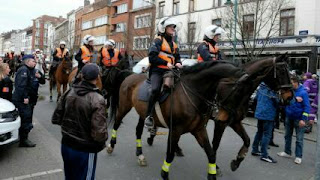Iman Zayat
Arab Weekly
February 10, 2019
Whether the Regueb institution is a jihadist camp or some sort of a religious cult, we need more than condemnation. We need action.
A fierce debate has taken hold in Tunisia, pitting two rival camps against each other: defenders of human rights and Islamists, both so-called moderates and fundamentalists.
The debate was set in motion by a television programme titled “Four Truths,” presented by Tunisian journalist Hamza Belloumi on the privately owned Elhiwar Ettounsi channel. The episode featured controversial issues that have been in the news, such as illegal poaching by Qatari hunters and widespread corruption within Tunisia’s vehicle inspection services.
The last segment, however, shocked viewers. It detailed an investigative report into a bizarre “Quranic” school in the rural central Tunisian town of Regueb, where dozens of children were being housed and indoctrinated with extremist ideas.
The report — confirmed by an official investigation — said 42 children aged 10-18 and 27 adults between the ages of 18-35 lived at the premises in conditions that were grossly unsafe and unsanitary. There they were taught religious precepts by figures who were unqualified, unlicensed and often abusive.
The horror only begins there. When not being inculcated with extremist ideas, the children were subjected to forced labour on construction and farm sites, reports said. Many were found to have contracted asthma, scabies and lice because of the horrific conditions. At least nine children reportedly suffered sexual abuse at the institution, where they were supposed to be learning about Islam and its spiritual values.
The scandal drew fierce outcry throughout the country, with most assailing the institution and the state for failing to protect the children. However, some Islamists lashed out at Belloumi, accusing him of being a “snitch” by alerting “secular authorities” to the illicit activity.
Amid this war of words, the most important question was left unanswered: Why was the state unable to fulfil its responsibility to protect the most vulnerable in our society?
We must obviously condemn and hold to account those who were involved and complicit in running this so-called Quranic school. Even more, there is a need to crack down on all institutions of this nature that may be operating under the radar.
We must also put to rest absurd claims advanced by some Islamists that the institution was nothing more than a legitimate Quranic school and that the journalist was a “snitch” by exposing its abuses.
First, we should note that Quranic schools, or madrasas, as per definition, are outlawed in Tunisia. Only katateeb (traditional schools) legally operate under the supervision of the Ministry of Religious Affairs. The difference between these two types of “schools” is night and day. While madrasas teach Islamic theology and religious law, katateeb teach Quranic recitation and certain basic Islamic rituals to children.
Most Tunisians do not understand this distinction, which is why Islamists have tried to frame the institution in Regueb as a “Quranic school.” By doing so, they hope to legitimise it in the minds of Tunisians who naturally respect the Quran and Islam. Ironically, by referring to the school as a “madrasa,” its defenders are effectively conceding that it is, by nature, illegal.
With this clarified, let us examine what was really happening in Regueb. Should this so-called school be characterised as a cult, led by a demented guru, or a jihadist training camp where children and young people were being prepped to conduct terror attacks? Or was it some combination?
The so-called Quranic school, led by self-styled imam Farouk Zribi, bears many of the hallmarks of a cult. It is in a remote area, far from public scrutiny. Its members — many underage — are isolated and indoctrinated with extremist beliefs while being subjected to severe exploitation and abuse. The parents of the children caught up in this nightmare have staunchly defended its leader.
If this is indeed a cult, like the one led by David Koresh in the United States in the 1980s and 1990s, how should we rid the country of it and potentially connected institutions? Is there really a difference between Eastern and Western cults?
To combat the problem, Tunisia must enact pointed legislation that prohibits extremist religious centres from operating under the guise of civic associations, as well as work to expose individuals, political parties or financiers that support such activities. Tunisia should work to improve the quality of its education system and counter efforts to infiltrate it by those with an agenda.
However, if the so-called Quranic school in Regueb is not a cult, it can only be described as a jihadist training camp. While this may shock many in Tunisia, it is time we come to terms with the existence of such radical elements, especially after the terror attacks that have taken place since the 2010-11 uprising.
If one of these institutions exists, it is likely there are others. Jihadists almost always operate in coordination, meaning that structures affiliated with the Regueb camp could be lurking throughout the country. Tunisian authorities, therefore, should be vigilant in getting to the bottom of who is behind this institution and whether there are affiliates.
Ultimately, whether the Regueb institution is a jihadist camp or some sort of a religious cult, we need more than condemnation. We need action. We need to actively work to protect children from such dangerous environments and provide care and rehabilitation to those rescued from them.
If Belloumi is, as some Islamists say, “a snitch to the secular authorities,” we should all join him in exposing the radical threats facing our country.
As a journalist, Belloumi simply did his job: He investigated and reported on the dire situation in Regueb in a professional and ethical manner. He and his partners at “Four Truths” deserve credit for daring to speak out about what others have long feared to.
https://thearabweekly.com/cult-quranic-school-exposed-tunisia


